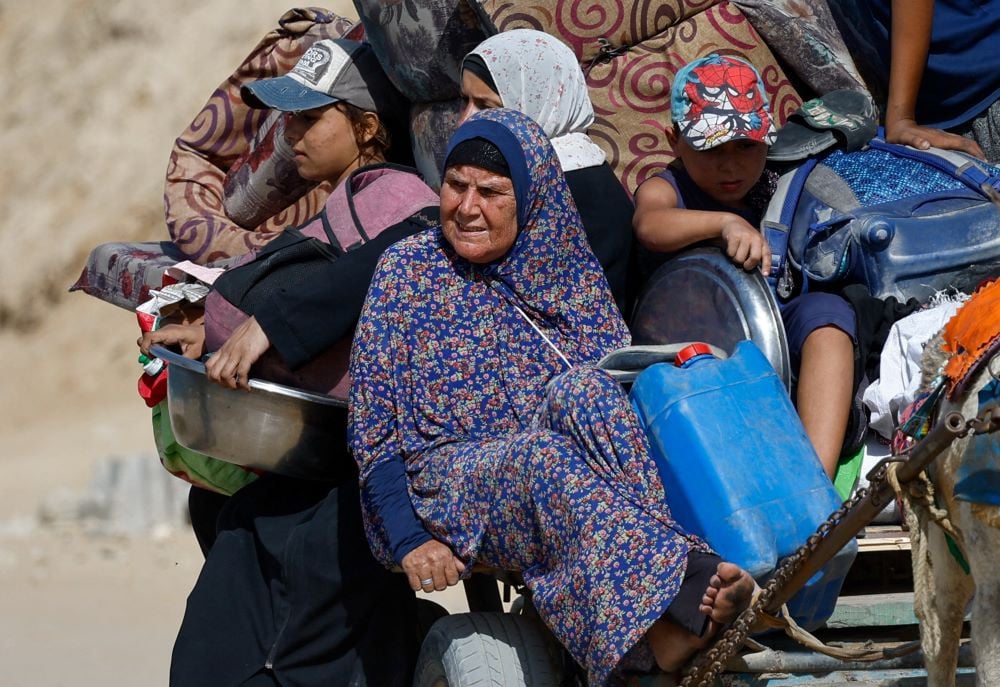Hamas, Israel sign ceasefire deal, rekindling hopes for peace in Gaza
Under the deal, fighting will halt as Israel pulls back from Gaza and Hamas frees hostages for prisoners

Israel and the Palestinian group Hamas signed an agreement on Thursday to cease fire and free Israeli
The Palestinian Authority expects a significant role in post-war Gaza, even though President Donald Trump's plan sidelines it for now, and is banking on Arab support to secure its position despite Israeli objections, Palestinian officials say.
Gaza's future governance has moved into focus with a ceasefire due to begin on Thursday, the first step in Trump's bid to end two years of war. The next phase of the deal must tackle thorny issues, including demands that Islamist militant group Hamas disarm and end its rule in Gaza, from where it launched the October 7 attacks on Israel that ignited the war.
Hamas seized control of the coastal enclave from Palestinian Authority (PA) President Mahmoud Abbas in 2007. Trump's proposal foresees an internationally supervised technocratic Palestinian committee taking over Gaza after the war. It requires the PA, which is based in the Israeli-occupied West Bank, to enact reforms before it can assume power.
While the PA has welcomed Trump's efforts, its officials have privately expressed disappointment. An alternative plan drawn up by Saudi Arabia and France had emphasised its leading role in Gaza.
Read More: Trump says peace deal ‘very close’ after Hamas submits hostage swap list
Abbas has already declared his commitment to tackling corruption, holding elections, and other reforms requested by Western nations, helping to convince several of them to recognise Palestine in recent weeks.
Three senior Palestinian officials said they still expect the PA to be deeply involved in Gaza. They noted the role it has played in the enclave since the Hamas takeover, paying salaries to tens of thousands of civil servants and overseeing essential services, including education and Gaza's electricity supply.
"We're already there," Prime Minister Mohammad Mustafa told Reuters. Mustafa, 71, was appointed by Abbas last year as part of a shake-up of the Authority after then-president Joe Biden made clear he wanted to see a revitalized PA take charge in post-war Gaza.

Foreign Christian pilgrims and other supporters of a ceasefire deal march through the Mahane Yehuda market in Jerusalem as they celebrate the Jewish holiday of Sukkot, also known as the Feast of Tabernacles, on October 9, 2025.PHOTO: AFP
"It's one thing to have some international, temporary arrangements to help and monitor things, it's another to govern and get things done," Mustafa said.
The three officials cited the PA's international standing as the Palestinians' representative body, and the support of Arab states that want Gaza and the West Bank reunited in an effort to preserve hopes of Palestinian statehood.
Many countries, including Arab states, believe the PA must be "in-charge" of Gaza not least because "they know that it's the only practical way of doing things", Mustafa said.
A spokesperson for Israeli Prime Minister Benjamin Netanyahu did not respond to a request for comment. The US State Department also did not immediately respond to Reuters' questions.
Also Read: Hamas hands over list of Israelis, Palestinians for swap deal
PM develops Gaza plan
Mustafa said international plans for Gaza's governance were still evolving, though the basics were covered in the US roadmap. Gaza's post-war transition will be the focus of an international meeting in Paris on Thursday.
Mustafa - a former World Bank official who once ran the Palestinians' sovereign wealth fund and is seen as close to Abbas - has been developing reconstruction plans since taking office 18 months ago.
With Egypt's support, he has scheduled a reconstruction conference to take place a month after the ceasefire.

Palestinian children celebrate at a camp for displaced people in Nuseirat in the central Gaza Strip on October 9, 2025, following news of a new Gaza ceasefire deal. Israel and Hamas on October 9 agreed a Gaza ceasefire deal to free the remaining living hostages, in a major step towards ending a war that has killed tens of thousands of people and unleashed a humanitarian catastrophe. PHOTO: AFP
Updated World Bank estimates put reconstruction costs for Gaza at $80 billion, up from $53 billion last October, he said. That's four times the combined GDP of the West Bank and Gaza Strip in 2022, according to the multilateral lender.
Also Read: Shehbaz hails Gaza ceasefire deal as ‘historic opportunity’ for lasting peace in Middle East
Arab states including Egypt, Jordan, and Qatar backed the Saudi-French plan, which called for a transitional administrative committee to be formed "under the umbrella of the" PA, and foresaw the deployment of an international stabilisation mission at the PA's invitation.
But Ghaith al-Omari, a senior fellow at the Washington Institute think-tank who once served in the PA, doubted the PA would now have a significant role in the initial phase of Trump's deal.
Arab states may well coordinate with it over appointments in the committee of Palestinian technocrats expected to rule Gaza under Trump's plan, but without giving it a veto, he said.
"The reference to the PA, vague as it may be, gives it some sort of standing; reinforces that Gaza and the West Bank are the same unit, which the Arabs wanted," he said. But he didn't expect Arab states to expend political capital pressing for a more concrete PA role early on.
The PA was set up in 1994 in what Palestinians hoped would be a step towards statehood in the West Bank, Gaza, and East Jerusalem, a goal that has appeared increasingly elusive as Israel has expanded settlements and ruled out Palestinian independence.
The Trump plan foresees a temporary international stabilisation mission deploying to train and support vetted Palestinian police forces, saying it would "consult with Jordan and Egypt".
Mustafa said the PA had already nominated some 5,500 Palestinians to be part of a new Gaza police force being trained by Egypt. The goal is to train at least 10,000 people.
Sabry Saydam of Abbas' Fatah movement told Reuters that Israel didn't want the PA to return to Gaza in order to maintain the split between the two Palestinian territories. "The Arab states support the presence of the PA (in Gaza)," he said, describing its Arab ties as better than ever.
Mustafa: Reform mustn’t be pretext for blocking statehood
Hamas officials have signalled their support for a PA role, saying it should be the "reference" for a new technocratic committee to which it is prepared to hand authority, seeing this as preferable to foreign supervision.
Trump's plan foresees former British Prime Minister Tony Blair as part of an international supervisory body, an idea that provoked strong criticism among Palestinians.
The failure to secure statehood has contributed to the PA's diminishing standing among Palestinians. Many Palestinians deem it corrupt. Opinion polls show Abbas, 89, is unpopular.
The PA last held elections in 2006.
Netanyahu has been firmly against its return to Gaza. He levels charges against the PA including incitement, saying in a September 26 UN speech that Palestinian textbooks teach children "to hate Jews and destroy the Jewish state".
Trump's plan calls on the PA to complete reforms outlined in his 2020 peace plan. This described the PA as corrupt and promoting "a culture of incitement" in PA-controlled media and schools. It also said Palestinian leaders must recognise Israel as "the Jewish state".
Washington has also sought an end to PA payments to families of Palestinians killed or jailed by Israel, which critics have described as "pay to slay".
The PA claims progress, abolishing a law governing such payments and pledging to reform school curricula in line with UN standards.
Abbas has, however, ruled out recognising Israel as a Jewish state, noting that the Palestine Liberation Organisation, which he chairs, recognised Israel in 1993 and that 21% of Israel's population are Arabs.
Mustafa said the PA had made "very good progress" on institutional reforms. "We don't want Israel to use this as a pretext for not proceeding with statehood, with reintegrating Gaza, with reconstruction of Gaza," he said.
Turkey on Palestinian state
Turkey aims to take part in a "task force" overseeing the newly agreed ceasefire in Gaza and the implementation of its articles, President Tayyip Erdogan said on Thursday, as Ankara appeared to have emerged as a key player in both the negotiations and execution of the deal.
Turkey, which participated in the ceasefire negotiations in Egypt, has been one of the harshest critics of Israel’s assault on Gaza, calling it a genocide. Since Israel launched its attack on Gaza two years ago, the NATO ally has been involved in a largely indirect capacity in peace efforts but took a heightened role in recent weeks.
“I am very pleased that the Hamas-Israel talks taking place in Sharm el-Sheikh, with contributions from us as Turkey, have resulted in a ceasefire in Gaza,” Erdogan posted on X earlier on Thursday.
He thanked Trump “who demonstrated the necessary political will to encourage the Israeli government towards the ceasefire”, as well as Qatar and Egypt, adding Ankara would not stop until a sovereign Palestinian state was established.
UN chief welcomes deal as path toward Palestinian statehood
UN Secretary-General Antonio Guterres welcomed the agreement to secure a ceasefire and hostage release in Gaza on Thursday and said it represented a path toward self-determination of the Palestinian people.
“I urge all to seize this momentous opportunity to establish a credible political path forward,” Guterres said at the United Nations. “A path towards ending the occupation, recognizing the right to self-determination of the Palestinian people, and achieving a two-state solution.”
‘Assurance of full access for humanitarian groups,’ Norway
The Norwegian Refugee Council, one of the largest independent aid groups working in Gaza, said President Donald Trump’s plan to increase aid to starving people as part of a ceasefire will fail unless all aid groups can resume operations.

Displaced Palestinians, fleeing northern Gaza due to an Israeli military operation, ride a vehicle pulled by an animal as they move southwards following Israeli forces' orders to leave Gaza City, in the central Gaza Strip October 3, 2025.PHOTO:REUTERS
“The desperation is deeper and the exhaustion is greater than anyone can imagine inside Gaza ... It’s not enough with some UN agencies and some few NGOs,” Jan Egeland, NRC head, told Reuters in an interview via video link from Oslo. “If not, the Trump peace plan will not succeed ... We don’t have time for more bureaucratic obstacles.”
Egeland said NRC, among other international NGOs, had been blocked from bringing aid into Gaza since Israel lifted its 11-week blockade on supplies in May. Israel has said there is no limit on quantities of food aid entering Gaza and accuses Hamas of stealing aid, accusations the Palestinian group denies. COGAT, the arm of the Israeli military that oversees aid flows into Gaza, did not immediately reply to a Reuters request for comment.
The NRC is resubmitting a request to get hundreds of truckloads of lifesaving aid into Gaza, which had been denied access for months.



















COMMENTS
Comments are moderated and generally will be posted if they are on-topic and not abusive.
For more information, please see our Comments FAQ